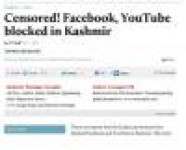Curbs on freedom of expression

The people of India had to bear two years of emergency during Indira Gandhi’s rule. Back then, it was easy to control the media channels. There were a few print media houses that needed regulation. Satellite TV and Internet, people thought, would make media free from regulations, censorship, and blackouts. It may be true elsewhere; not in Kashmir.
As of now, there is no official word regarding the blocking of the facilities. The government order states that it has only blocked www.youtube.com in order to prevent the access to the controversial “anti-Islam video”. The order to this effect was issued by the State Home Department, bringing into force the powers conferred under section 5(2) of the Indian Telegraph Act 1885.
However, one fails to understand the basis of the order. The “anti- Islam video”, stated to be the reason for blockade, would not have caused problems. No Muslim would see it, for Islam strongly stress against any pictorial reference to Prophet Mohammad. Hence, whether the people in Kashmir will have access to the video or not does not matter at all. Having said that, if at all the government needed regulation, it could have blocked the video as it did in 2012, when it blocked a clip showing Kashmiri men being stripped and beaten by the State police. The government at that time had even said that it would register cases against Youtube and Facebook, besides cracking down on people who had tried to propagate it.
In case of Facebook there is not even a pretext for blocking it. In fact, the government has denied having any knowledge of Facebook blockade. As of now, Facebook is accessible on connections other than GPRS. However, Youtube has been completely blocked. The step is to stop the online dissent from the Valley. There are reports that GPRS facility has been altogether withdrawn. With blocking of these sites and GPRS facility, India will stand no different from the “iron fist” governments which have taken similar steps.
This is not for the first time that the government has taken steps to stem the flow of information from social networking sites. Earlier, cases and arrests have been made against netizens in Kashmir.
A few days after the sites were blocked for the first time in September, PTI reported that the Union Government had asked the telecom operators to provide ‘full proof’ monitoring of Internet in J&K, making it almost impossible for any alternative voices to have a say. This is worse than what a dictator with a full brigade of spies could do. This is what Mubarak did in Eygpt and Assad in Syria. This is what China has been doing for long.
Following this blockade there are reports that the Internet speed in J&K had reduced . It is pertinent to mention that 3G Internet is still non-functional in J&K.
Time and again, reports, whether from media or from various commissions appointed by the government, have stressed that there is a sense of alienation among the people of J&K which needs to be addressed. Steps to curb free speech will further widen the gap.